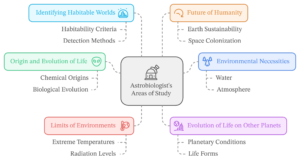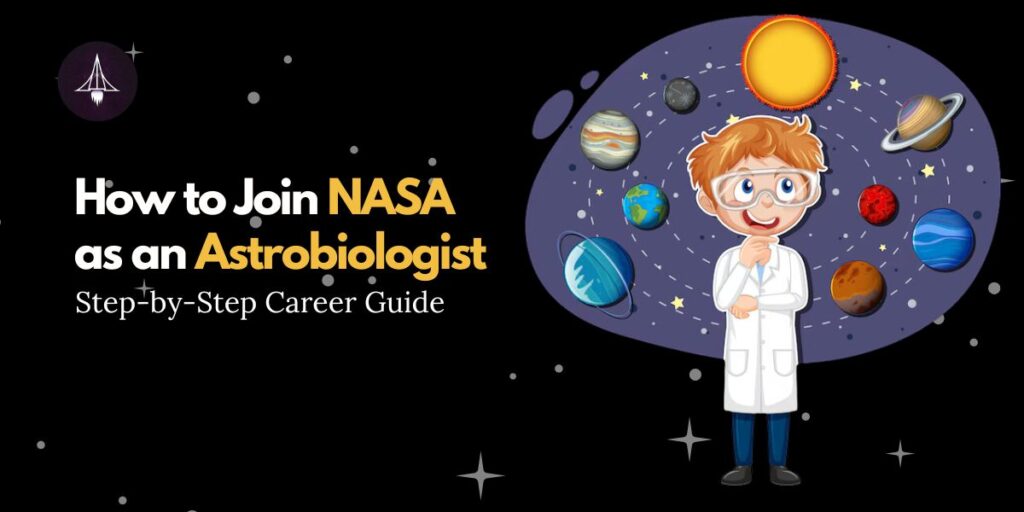NASA stands out as a premier destination for aspiring Astrobiologist. Working at NASA offers access to cutting-edge technology and unique resources, offering designing experiments and analyzing data from Actual Space Missions. Moreover, the collaborative environment fosters partnerships with experts from various scientific disciplines, enriching the research experience.
This blog will walk you through the steps to becoming an astrobiologist—what to study, where to find opportunities, and how to make your mark in this evolving field.
Understanding Astrobiology:
Astrobiology is a field of study of Life in the Universe including its origins, evolution, and distribution across the vast Universe. It contemplates the fundamental requirements that give Life in the Universe. Astrobiologists conduct research on extremophiles (organisms that thrive in extreme conditions), to search for signs of life on other planets and moons. Some of the universe’s most intriguing mysteries—how life began, whether it could exist on other planets, and how it might endure in the harshest conditions. For those with a passion for exploring the cosmos, this field offers a unique opportunity to make meaningful contributions to our understanding of life across the universe.
Who is an Astrobiologist?
Astrobiologist is a scientist who studies life in the Universe and the possibility of life beyond the Horizon of Earth, in deep space. They incorporate knowledge of many subjects including Astronomy, Biology, Chemistry, Geology, Atmospheric Science, and Aeronautical Engineering etc. This interdisciplinary approach allows scientists to explore the possibilities of life beyond Earth and the environments that could support it.

Educational Requirement:
If you are an Indian student aspiring to become an astrobiologist and join NASA, here’s a simple and direct educational pathway to follow:
- Complete Your 12th Grade: Focus on Science subjects: Physics, Chemistry, and Biology (PCB) or Mathematics (PCM). Aim for good grades to qualify for reputable undergraduate programs.
- Bachelor’s Degree (in relevant field):
- B.Sc. in Biology or B.Sc. in Physics.
- B.Sc. in Geology or B.Sc. in Environmental Science.
- B.Tech in Biotechnology or B.Tech in Space Technology.
- Choose institutions known for strong science programs, such as the Indian Institute of Science (IISc) or Indian Institutes of Technology (IITs).
- Master’s Degree (in Astrobiology or related field):
- M.Sc. in Astrobiology or specialized Master’s programs in Microbiology, Planetary Science, or Environmental Science.
- Consider universities like Indian Astrobiology Research Foundation (IARF) (International Diploma in Astrobiology) or Tata Institute of Fundamental Research (TIFR) that offer research-focused programs.
- Doctoral Studies:
- For advanced positions, a PhD is often necessary. Focus your research on astrobiology, astrobiological chemistry, or exoplanet studies.
- Collaborate with institutions or research centers that are involved in space missions or astrobiology.
Internships and Research Opportunities:
In India:
- ISRO Internships: The Indian Space Research Organisation (ISRO) offers internships for students in various scientific fields, including astrobiology and space research.
- Apply through the ISRO official website, focusing on their summer internship programs and student research schemes.
- National Aeronautics and Space Administration (NASA) India Collaborations: Explore internships through NASA’s collaborations with Indian institutions. Some Indian universities may have partnerships allowing students to participate in research with NASA-affiliated projects.
Abroad:
- NASA Internships: NASA offers internships for students at various levels. These can be research positions that directly relate to astrobiology.
- Visit the NASA Internships page for application details and eligibility requirements.
- European Space Agency (ESA): ESA provides internship programs and research opportunities for students interested in space sciences, including astrobiology.
- More information can be found on the ESA Careers page.
- Research Fellowships: Look for research fellowships at universities abroad (e.g., MIT, Stanford) that have strong programs in astrobiology or planetary sciences. They often seek graduate and undergraduate researchers for their labs.
7 Steps for Applying to NASA:
- Understand NASA’s Opportunities: Visit the NASA Careers page to explore positions related to astrobiology, including internships and fellowships.
- Focus on Education: Pursue a relevant degree such as a B.Sc. in Biology, Chemistry, Physics, or a related field. Higher degrees (M.Sc. or Ph.D.) are often preferred for research roles. Maintain a strong academic record (aim for a GPA of 3.0 or higher). For more details, check out this.
- Gain Practical Experience: Engage in internships or research projects at Indian institutions like ISRO or IISc, focusing on astrobiology or related sciences. Participate in workshops and projects that enhance your research skills.
- Prepare Application Materials: Create a focused resume that highlights your educational qualifications and relevant experience. Write a tailored cover letter or statement of purpose (SOP) expressing your passion for astrobiology and your desire to contribute to NASA.
- Secure Recommendations: Obtain strong letters of recommendation (LOR) from professors or research supervisors who can attest to your skills and dedication.
- Monitor Deadlines: Keep track of application deadlines for internships and jobs at NASA. Internships are typically announced in the fall and spring.
- Interview Preparation: If you receive an interview call, prepare by researching common questions related to astrobiology and reviewing your experiences. Practice explaining your interest in the field and how you can contribute to NASA’s mission.
Conclusion:
Becoming an astrobiologist at NASA is an exciting goal for students in India. By choosing the right studies, gaining hands-on experience, and making connections in the field, you can stand out as a candidate. Keep an eye on internship and job openings, and prepare well for applications and interviews. With hard work and passion, you can help explore the possibilities of life beyond Earth. Start your journey now – NASA is waiting for you!
FAQs:
- What do I need to study to become an astrobiologist?
You need at least a Bachelor’s degree in fields like biology, chemistry, or planetary science. Higher degrees like a Master’s or Ph.D. are often required. - Can I find internships in astrobiology?
Yes, there are internships available at NASA and other research centers. These provide hands-on experience in astrobiology. Check NASA’s website for details and deadlines. - How can I improve my chances of working at NASA?
Focus on your studies, gain relevant experience through internships, and network with professionals. Also, prepare well for your applications and interviews.
About Us:
SciAstra is a team of scientists and research scholars from the top research institutes around the world, like Oxford, Harvard, Cambridge, and so on. Our vision is to promote critical thinking and scientific temperament by helping students pursue careers in science.
We offer many free and paid courses where our mentors from the top research institutes like IISER, NISER, IACS, CMI, ISI, IISC Bangalore, etc., teach students in live classes, with study materials, mock tests, books, and everything needed. We have taught more than 10,000 students already since 2021 and achieved over 1000 selections with AIR 1, 7,10, 12, and 13 in IISc Bengaluru, IISERs, NISER, IACS, and so on. If you are looking to prepare for IAT / NEST 2025, you can check out our courses and get access to live classes, recorded lectures, study material, mock tests, doubt-clearing classes, and much more!
To know more about us, click here OR download the SciAstra App from the Play Store and App Store!






very good well done thank you so much
hemama-segc.